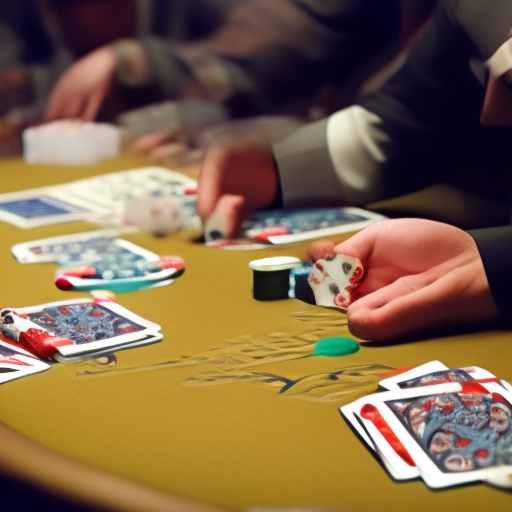The game of poker is a world of vast and exciting prospects, but it requires more than just luck and good hand selection to win. To gain a better understanding of how to succeed in poker, it is important to understand the psychological factors that influence your play. Investigating the psychology of poker strategy can help you improve your chances of success and ultimately take your game to the next level.
1. The Psychology of Poker
Poker is a game that’s not just about luck – it’s also about strategy, nerves, and mind games. It’s why this card game has become such a hit around the world, whether you’re playing with your friends or in a major tournament. To be successful in poker, you need to understand the psychology behind it – the way that people think and react to different situations.
One of the biggest things about poker psychology is understanding how to read people’s emotions. When you’re at the table, everyone is trying to hide their true feelings, but there are still ways to see if someone is bluffing or if they’re confident in their hand. You need to learn how to spot physical cues like sweating, fidgeting, and nervous ticks. You also need to listen to the way people are talking and watch their body language closely. By doing this, you’ll be able to make better decisions about when to raise, when to call, and when to fold. Remember, don’t let your own emotions get in the way! In poker, being too emotional can be a major disadvantage.
2. Factors Influencing Poker Strategy
Poker is a game that requires not only luck but also strategy. The latter becomes especially important when playing against seasoned players who have mastered the art of reading opponents’ body language and analyzing the probability of possible outcomes. The factors that influence poker strategy range from the player’s personality to the number of opponents in a game.
One of the most critical factors that influence poker strategy is the number of players in the game. The more players, the more hands you will have to be cautious with. This means that you cannot afford to take risks as you would in a game with fewer players. Another factor is the personality of the player. Some players are naturally aggressive and tend to take risks, while others prefer to play it safe. Understanding your personality and adapting your strategy to it is key to success in poker. In addition, the type of game being played and the skill level of the opponents are also factors worth considering. By constantly adapting to these factors and assessing the situation, players can develop a winning poker strategy.
3. Understanding Opponents’ Mindsets
Knowing how your opponents think is one of the most important skills you can have as a strategist. By understanding their mindset, you can predict their decisions, spot their weaknesses, and identify opportunities for victory. So, how do you get inside your opponents’ heads? Here are some strategies to consider:
Observe their behavior: Pay attention to how your opponents act during the game. Do they play aggressively, or are they cautious? Do they take big risks, or do they play it safe? Look for patterns in their behavior that can give you clues to their strategy and temperament. Understanding their playing style is a key to gaining an edge over them.
Put yourself in their shoes: Try to think like your opponent. Consider what their goals might be, and what moves they might make to achieve those goals. Think about what kinds of risks they might be willing to take, and what kinds of traps they might fall into. By imagining yourself in their position, you can better anticipate their next move and plan your own accordingly. This is a key to turn the game in your favor.
Keep in mind that understanding your opponents’ mindsets is not about reading their minds. It’s about assessing information and making informed decisions based on what you know. These techniques can help you unlock the secrets of your opponents’ thinking and give you the advantage you need to emerge victorious.
4. Harnessing the Power of Psychology in Poker
Psychology plays a huge role when it comes to winning in poker. Having the right mindset and understanding your opponents can give you an edge in the game. Here are a few tips to harness the power of psychology in poker:
– Understanding your opponents: Try to observe your opponents and take note of their tendencies. Do they fold easily when they have a weak hand? Do they bet aggressively when they have a good hand? By understanding their tendencies, you’ll be able to ‘read’ them and make informed decisions.
– Managing your emotions: Poker can be an emotional game, and it’s important to keep your emotions in check. Don’t let a bad beat or a string of losses get to you. It’s important to stay calm and focused. Take a break if necessary and come back when you’re in the right mindset.
By using psychology in poker, you’ll be able to make better decisions, manage your emotions and ultimately increase your chances of winning. Remember, poker is not just about the cards you’re dealt, but also about how you play them. Using psychology in your poker strategy is one of the best ways to level up your game. It allows you to understand the opponents and their motivations, giving you an edge in each hand. This knowledge can help you become a more formidable opponent and develop new strategies to outwit your opponents. Best of luck as you explore the psychological aspects of poker!